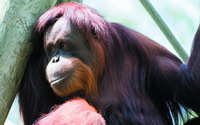快乐的人往往长寿,这一点似乎同样适用于猩猩。

研究显示快乐的猩猩更长寿
在日前发表于《生物学快报》网络版上的一项新研究中,研究人员通过让动物园管理员回答一份由4个问题构成的调查问卷,从而对生活在动物园中的184只猩猩的幸福感进行了研究。管理员被要求评估猩猩总体的积极情绪、社会生活,以及达到渴望的地点和得到想要的东西的能力。在调查结束后的7年内,那些被认为最快乐的猩猩去世的可能性不及42%。
研究人员推测,与人类一样,快乐的猩猩往往具有更少的压力和健康问题,这有助于它们长寿。
生物探索推荐英文摘要
Happy orang-utans live longer lives
Abstract:Nonhuman primate ageing resembles its human counterpart. Moreover, ratings of subjective well-being traits in chimpanzees,orang-utans and rhesus macaques are similar to those of humans: they are intercorrelated, heritable, and phenotypically andgenetically related to personality. We examined whether, as in humans, orang-utan subjective well-being was related to longerlife. The sample included 184 zoo-housed orang-utans followed up for approximately 7 years. Age, sex, species and number oftransfers were available for all subjects and 172 subjects were rated on at least one item of a subjective well-being scale.Of the 31 orang-utans that died, 25 died a mean of 3.4 years after being rated. Even in a model that included, and therefore,statistically adjusted for, sex, age, species and transfers, orang-utans rated as being “happier” lived longer. The risk differentialbetween orang-utans that were one standard deviation above and one standard deviation below baseline in subjective well-beingwas comparable with approximately 11 years in age. This finding suggests that impressions of the subjective well-being ofcaptive great apes are valid indicators of their welfare and longevity.







